- Home
- Keigo Higashino
A Midsummer's Equation: A Detective Galileo Mystery Page 5
A Midsummer's Equation: A Detective Galileo Mystery Read online
Page 5
“Of course, in these parts after nine, it’s pretty dark, so unless he was walking on the road or standing someplace out in plain sight, we didn’t have much of a chance of finding him,” Shigehiro added.
Nishiguchi nodded. There were no streetlamps anywhere along the hill up from the station.
Hashigami took his cell phone out of his pocket and stepped outside to phone in a report.
“Still, I never imagined he’d turn up like this,” Shigehiro said, putting a hand on his head. “Where was he found?”
“The seawall right around where the Headland Restaurant used to be,” Nishiguchi said, referring to a place that had closed three years earlier.
“With all the rocks around there, that would be a pretty nasty place to fall,” Shigehiro said.
“I wonder why he was down there in the first place,” Narumi said.
“Out for a walk, most likely. Maybe wanted to see the ocean at night. Or maybe he just wanted to walk off dinner and the drinks.”
“So he climbed up on to the seawall and then fell off?”
“I suppose so.”
Narumi’s eyes went to her old classmate. “Is that what happened?”
Nishiguchi shrugged. “We can’t say for sure. The investigation’s only just started.”
Narumi grunted, unimpressed.
Hashigami returned from outside and whispered, “The bags,” into Nishiguchi’s ear.
“If you don’t mind, we’d like to check Mr. Tsukahara’s belongings. Could you show me to his room?” Nishiguchi asked.
“Happy to,” Setsuko offered.
The two detectives got on the elevator with her. Nishigami pulled on his gloves while they were riding up.
There were eight guest rooms on each floor, each with its own name. Masatsugu Tsukahara had been staying in one called the Rainbow Room. The room was large, with a low table and floor cushions pushed off into one corner and a futon laid out on the tatami mats. There was a strip of hardwood flooring over by the window with a chair and another smaller table.
“Who spread out his futon and when?” Nishiguchi asked.
“It was a little after seven, I think. I came up while Mr. Tsukahara was at dinner. My husband doesn’t do the futons anymore on account of his knee, so when we don’t have any part-time staff around, me and Narumi handle things.”
The futon looked untouched. Tsukahara must have left the room right after coming back from dinner.
His luggage was a single, old traveling bag. Hashigami examined the contents, finding a cell phone. It was a simple one with only a few basic functions, designed for elderly users.
His clothes had been neatly folded and placed in a corner of the room: an open-collar shirt and gray slacks. Nishiguchi fished in the pockets and found his wallet, with a decent amount of cash inside.
He checked the driver’s license. Both the name and the address were the same as in the ledger downstairs. Then he pulled another card from the wallet.
“Uh-oh,” Nishiguchi said.
“What you got?” Hashigami asked.
“A union member’s card. To our union. He’s a cop.”
EIGHT
Kyohei woke up from a dream of someone shouting. He looked around. The ceiling and the walls were unfamiliar.
It took him a moment to remember he was staying at his aunt’s. The train ride down, the fireworks with his uncle the night before—the events of the day before came filtering back slowly. But this room wasn’t the one they had brought him to when he arrived. He didn’t see his backpack anywhere, either.
Then he remembered his uncle suggesting they go eat watermelon. This room was his uncle’s living room, then. He had been eating watermelon, and his uncle left to call one of the guests. He remembered starting to watch TV, but nothing after that.
Kyohei got up and looked around. The table he had been eating his watermelon on had been pushed into the corner. He was wearing the same T-shirt and shorts from the night before. I must’ve fallen asleep watching TV.
There was a clock on the television stand that read 9:20.
Kyohei opened the sliding door and went out into the hall. He heard voices from the lobby and went out to find two men standing there. One was middle-aged, short, and heavyset. The other one was younger and looked pretty fit. Uncle Shigehiro was out on the wicker bench, talking to them.
“Hey there, Kyohei. You just get up?” his uncle said.
The man looked in his direction, and Kyohei stopped abruptly.
“This your nephew?” the middle-aged man asked his uncle.
“Yes, my wife’s brother’s kid. He’s here for summer vacation.”
The man nodded at that. Behind him, the younger man was writing something down on a notepad.
“Anyway, if you wouldn’t mind leaving the room exactly as it is?” the man asked.
“No problem,” Shigehiro replied. “I’m sure we won’t need it with summer break gone. It’s not like people are breaking down the doors to get reservations,” he added with a chuckle.
Kyohei wondered what had happened and what room they were talking about.
“Uncle Shigehiro?” he asked. “Can I go to my room?”
Shigehiro looked at the middle-aged man. “He’s on the second floor. That’s not a problem, right?”
“Of course, not at all,” the man said, smiling at Kyohei. “Think I can ask you to stay off the fourth floor, though? There’s something up there we have to check out.”
“They’re the police,” his uncle said, and Kyohei’s eyes widened.
“The police? What happened?”
“Well, that’s probably best left for another time,” his uncle said, nodding his head toward the men.
Kyohei knew this particular routine well. It was just another case of grown-ups keeping secrets from kids for absolutely no reason whatsoever.
It used to annoy him so much that he would start asking questions, but he’d given up trying. Instead, he grunted and headed back to the elevator.
He was about to press the button when he had a thought and glanced toward the dining rooms. There were slippers in front of one of them.
Walking quietly, Kyohei approached the room. The sliding doors were wide open. He peeked in and saw Yukawa sitting exactly where he had the night before. He was stirring something on his tray, but his hand stopped abruptly, and he said, “Do you like peeking in on other people eating?”
Kyohei reflexively drew back from the door, then gave up and walked out into the open. Yukawa was draping sticky beans over his morning rice. He hadn’t even looked in Kyohei’s direction.
“I was just wondering who was in here,” Kyohei said.
Yukawa answered that with a snort and a slightly derisive smile. “That was a waste of your time. If you’d thought about it, you would’ve realized that this is a dining room expressly for the use of guests. Which makes it likely anyone in here was a guest. Given that there are only two guests staying in this entire inn, and that one of them is no longer with us, that leaves only one person it could’ve been. Namely, myself.”
“What do you mean, ‘no longer with us’? Did the other guy leave?”
Yukawa’s chopsticks stopped in midair. His eyes met Kyohei’s for the first time. “Oh,” he said. “You haven’t heard.”
“I know something happened. The police are here. But they didn’t tell me what.” He looked down at his feet. “Typical.”
“Don’t sulk. Usually when grown-ups hide something from you, it’s because knowing it won’t do you any good.” Yukawa took a sip of his miso soup. “They found his body down by the harbor.”
“His body? What, he died?”
“Apparently he left the inn last night at some point and never returned. This morning they found him on the rocks by the seawall. They think he might’ve fallen by accident in the night.”
“Oh, wow. How did you hear?”
“The girl who works here. Narumi, was it? My breakfast was late, so I went to find out why, and she
told me the whole story.”
“Ah,” Kyohei said, looking down the hallway. He wondered where Narumi was now.
“I believe she’s at the police station,” Yukawa said, seeming to read his mind. “Along with the woman who runs the place.”
“Why did my aunt have to go down to the police station?”
“So that they can write up an official report. Your aunt was the only one who spoke with the man. They probably want to know whether there was anything unusual about his behavior yesterday.”
“They have to go through all that trouble just because he fell on some rocks?”
Yukawa’s chopsticks stopped again and he looked at Kyohei. “You should consider the feelings of the deceased’s family. Do you think they’d be satisfied if the police just told them, ‘Oh, he fell on some rocks’? No, they probably want to know how it came to pass, in as much detail as possible. Personally, I would hope the police take their investigation very seriously.”
“What’s that supposed to mean?”
“It’s not supposed to mean anything beyond what I said,” Yukawa said, eating some of his rice with sticky beans and reaching for a teacup.
“Can I ask you something?” Kyohei asked.
“If it’s about what happened, I’ve already told you all I know.”
“No, not about that. I was just wondering why you decided to stay here. There are lots of inns in town.”
Yukawa picked up the cup and shrugged. “Should I not have stayed here?”
“No, but didn’t you have reservations somewhere before you came?”
“I did, but not my own reservations. Somebody at DESMEC arranged them for me.”
“Hey, I know them. They’re the ones that want to dig up the seafloor, right? Narumi doesn’t like them.”
Yukawa chuckled. “Right. Well, I’m not exactly allies with DESMEC either. Mostly because I don’t have a position on their undersea resource development proposal. This is why I want to avoid being in their debt as much as possible. One might think it only natural for them to provide lodging, since they asked me to come down and help with their informational hearing, but it bothered me nonetheless. That’s why, when I met you, I decided on this place. That seems like as good a reason as any to me.”
“I guess. You’re pretty strange for a professor.”
Yukawa furrowed his eyebrows. “Professor?”
“You teach science at a university, right? Doesn’t that make you a professor? Or are you just a teacher?”
“Either one is fine. I do have my doctorate, but I doubt you’re that interested in my credentials.”
“I’ll call you Professor, then. It sounds better.”
“As you like. So, exactly how am I strange?”
“Well, if it was me, I would’ve stayed at the place they got for me. I bet it’s a better inn than this one.”
“I heard it was the fanciest resort hotel in Hari Cove.”
“See? They’ve got money. I bet they’d pay you a lot if they go through with this undersea mining thing, too.”
Yukawa finished his tea, then, shaking his head, set down his cup. “Scientists don’t make decisions based on potential profit. What a scientist must consider foremost is which of the many available paths will lead to the greatest benefit for humanity. Even if said path doesn’t result in any personal gain, it’s still the one to pick. Of course, ideally, we hope that the most beneficial path also results in personal gain.”
Kyohei decided that the professor was a bit of a talker who liked making things sound more complicated than they really were. Who used words like humanity in a sentence like that?
“So scientists aren’t interested in money?”
Yukawa shook his head again. “No. We are interested in money. I want money, myself. If you’re offering me some with no strings attached, I’ll be happy to take it. My point is, I don’t conduct research for the sake of money alone.”
“But studying science is your job, right? And they pay you to do your job, don’t they?”
“I receive a salary from the university, yes.”
“Then you should think more about making money. If Mom and Dad hire somebody to work at their shop, and that person doesn’t make money for them, that person needs to be fired. They say that all the time.”
Yukawa scooted back from the table, crossed his legs, and turned to face Kyohei straight on. “We seem to have a misunderstanding on some basic things here, so let me explain. I receive my salary in exchange for teaching physics to university students. I conduct my own research as well, of course, but no matter what great papers I might write, the university won’t give me any more money for them. They do pay any expenses incurred by the research, but you can consider that more of an investment. Should one of my papers win an award, like the Nobel Prize, that would confer a good deal of prestige on the university.”
Kyohei stared at the professor. “You’re gonna win the Nobel Prize?”
“It was merely an example,” Yukawa said, pushing up his glasses with his finger. “Scientists want to uncover the truth. You understand what the truth is?”
“Like true or false? Sure.”
“I’m talking about a deeper truth. For example, a lot of physicists are very interested in how the universe came to be. Have you heard of neutrinos? They’re particles released when a star goes supernova. By analyzing these particles, you can understand things about the nature of stars an almost unimaginable distance away, but if you ask what sort of benefits that kind of research brought society, I’d have to agree that the benefit to our daily lives is practically nonexistent.”
“So why do they do it?”
“Because they want to know,” Yukawa said. “You used a map to get to this inn yesterday, did you not? Because of that map, you are able to find your way up the road without getting lost. Likewise, in order for us as a species to walk the correct path in life, we need a very detailed map that will tell us what the world is like. Except our map is incomplete, almost entirely useless. Which is why, even now, in the twenty-first century, people are still making mistakes. War and the destruction of the environment and countless other things persist because the only map we have is woefully lacking. It’s the mission of scientists to fill in those missing pieces.”
“I don’t know. It sounds kind of lame.”
“What’s lame about it?”
“Well, the not getting paid part, for one thing. Why do it if you don’t get paid? Anyway, I don’t much like science class in school. Most of the stuff we learn there is totally useless. What’s so fun about studying science?”
“Everything. You just don’t know it yet. The world is full of mysteries. And the joy of uncovering even the slightest mystery is incomparable to any other joy you will ever know.”
Kyohei shrugged. “If you say so. It’s not my thing. I’m not sure me worrying about humanity taking the right path will mean much of anything unless I become president of America or something.”
Yukawa chuckled. “My fault for taking the big example. But we can narrow our focus down to the choices a single person has to make. Whenever you take an action, you have to make a choice. What are you going to do today?”
“I haven’t decided yet. My uncle said he’d take me down to the ocean last night, but after that guy dying, I’m not so sure that’ll happen.”
“Let’s assume that your uncle is available to take you down to the ocean. You’ll have a choice: to go to the ocean as planned, or put it off for another time.”
“That’s not a choice. If my uncle could take me, why wouldn’t I go?”
“Well, what if it were raining?”
Kyohei looked out the window. “Is it supposed to rain?”
“I have no idea. But even if there are blue skies now, the weather could take a turn for the worse, couldn’t it?”
“Well, I could check the weather before going.”
“Ah, yes, the weather. And who do you have to thank for the weather report? Scientists. Exce
pt, modern weather reporting is not entirely accurate. You probably want a weather report that’s going to tell you exactly what it’s going to be like on the beach when you go today—specifically, what it’s going to be like an hour from now, and for another hour after that. Wouldn’t you?”
“If they had a weather report like that, sure.”
“You say they, but what could you do about it?”
“Um, nothing? I don’t know how to tell the weather.”
“You could ask someone who does. Say, one of the fishermen down at the harbor. They’d probably be able to tell you. Every morning they get up and judge the weather before they go out fishing. They have to, because it could cost them their lives if the sea got too rough. They can’t just rely on the weather reports, they have to rely on what they know about the weather the day before—the color of the sky, the direction of the wind, the humidity, et cetera—to get the most accurate prediction possible. That is science. What you’re studying in school science isn’t helping you? Fine. Try learning how to read a weather chart, and then tell me if science still isn’t helping you.”
Kyohei was silent. Yukawa stood, a satisfied look on his face. He started to leave, but then he stopped and looked down at Kyohei. “It’s okay if you don’t like science,” he said, “but that doesn’t mean you can just ignore things you don’t understand. It’ll come back to haunt you.”
NINE
Central Hari was the largest train station on the local line and the closest to the police department. There was a rotary out front for buses and taxis. Still, to anyone coming from Tokyo, it would look like the sticks, thought Nishiguchi. He headed up to the city himself a few times a year and was always a little awestruck by the size and complexity of the stations.
“Anytime now,” Motoyama said, looking down at his watch. Nishiguchi checked the time. It was 2:20 p.m.
The two detectives were standing just outside the gates at the station, waiting for an express train. They’d both been on their feet since the morning, and their shirts were soaked with sweat. Both of them were wearing jackets, however, and their ties were tied tight and straight.

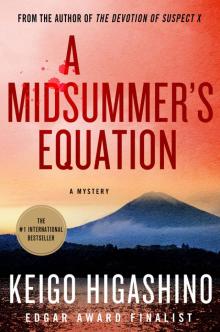 A Midsummer's Equation: A Detective Galileo Mystery
A Midsummer's Equation: A Detective Galileo Mystery The Devotion of Suspect X
The Devotion of Suspect X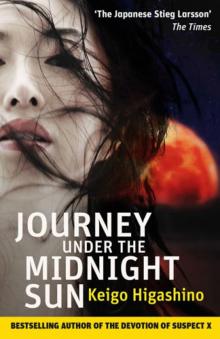 Journey Under the Midnight Sun
Journey Under the Midnight Sun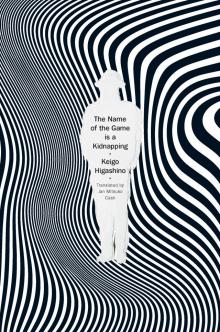 The Name of the Game Is a Kidnapping
The Name of the Game Is a Kidnapping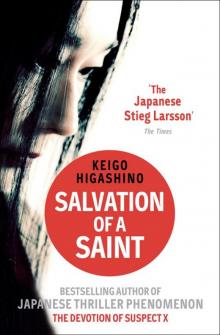 Salvation of a Saint
Salvation of a Saint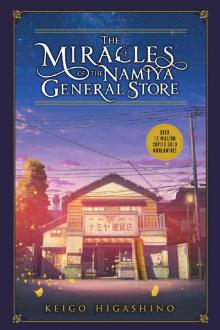 The Miracles of the Namiya General Store
The Miracles of the Namiya General Store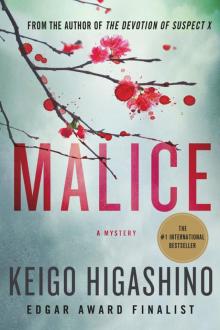 Malice: A Mystery
Malice: A Mystery